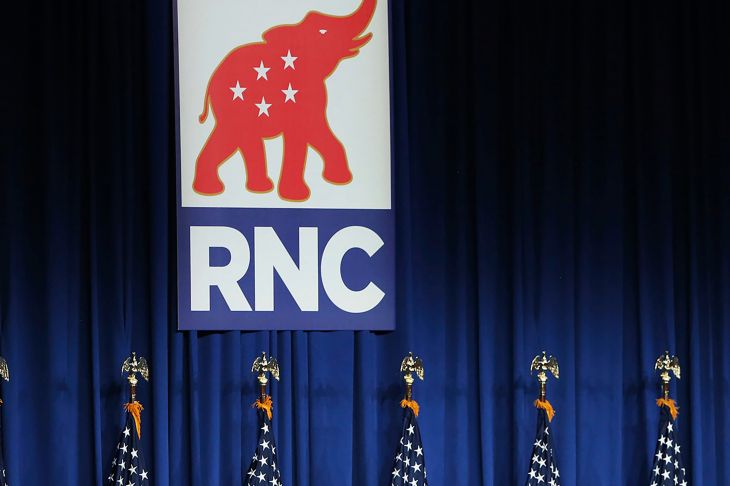Evangelicals have long been a significant voting bloc within the Republican Party. Their influence on the party's platform and electoral success cannot be overstated. However, the relationship between evangelicals and the Republican Party is complex, with both sides benefiting and facing challenges along the way.
In 1973, the U.S. Supreme Court made abortion legal throughout the country. This raised the hackles of Evangelical Christians everywhere and, for the first time, they banded together to fight a common cause.
This happened just at the point where technology made FM radio the hub for music lovers, freeing AM radio to seek other forms of programming. The Christian Right soon founded dozens of AM radio stations across the country that catered to these Evangelicals, and Christian preachers like Jerry Falwell and right-wing ideologues like Rush Limbaugh and others now had a national propaganda base from which to cultivate and shape this group of voters into an influential lobby.
Their efforts paid off in 1980 with the election of Ronald Reagan who ushered in a new era of conservatism after decades of liberal democratic governments that had overseen the cultural shifts of the sixties and seventies that glorified hedonistic lifestyles and values that went against mainstream America.
One of the key reasons for the strong bond between evangelicals and the Republican Party is the shared opposition to abortion. Evangelicals view abortion as a moral issue, believing that life begins at conception. The Republican Party has consistently advocated for pro-life policies, making it an attractive choice for evangelicals who prioritize protecting the unborn.
One issue that unites evangelicals and the Republican Party is the defense of traditional marriage. Evangelicals believe that marriage should be between one man and one woman, and the Republican Party has historically supported this view. This alignment has led to joint efforts to pass legislation and constitutional amendments defining marriage as exclusively heterosexual.
Religious freedom is also a significant concern for evangelicals, and the Republican Party has positioned itself as a defender of religious liberties. Evangelicals fear that their ability to practice their faith freely is under threat, particularly in areas such as healthcare, education, and public displays of religious symbols. The Republican Party has championed legislation protecting religious freedom, appealing to evangelicals who feel their beliefs are being marginalized.
Furthermore, evangelicals have found a home in the Republican Party due to its emphasis on conservative social values. The party's opposition to issues such as LGBTQ+ rights, comprehensive sex education, and the legalization of recreational drugs resonates with evangelicals who prioritize traditional moral values.
However, some evangelicals have expressed discomfort with the Republican Party's association with divisive rhetoric and policies. They argue that the party's focus on issues such as immigration, gun rights, and tax cuts for the wealthy does not fully reflect their values. This tension has led to debates within evangelical circles about whether their political allegiance should be reevaluated.
Moreover, the close association between evangelicals and the Republican Party has led to accusations of the politicization of faith. Critics argue that evangelicals have become too closely aligned with a particular political party, compromising their ability to be independent voices for justice and compassion. This criticism has prompted some evangelicals to advocate for a more nuanced approach to politics, focusing on issues rather than party affiliation.
However, the Evangelical Right appears to be the base for the current Republican Party in which Donald Trump, despite his flaws, is revered as the leader who must be defended at all costs. In many cases, Evangelicals believe that Mr. Trump is God’s “chosen one” to lead the United States back to greatness.
This has led many opponents to label Trump’s followers as a sect rather than a serious religious grouping and to crticise them for following the teachings of ideologues rather than those of Jesus Christ.
However, for most Evangelical Christians, the temptation of wielding political power at all levels of government is too strong a siren call to ignore. Sadly, the closer they come to power, the less they follow the teachings of their founder who called for love and inclusion of the many rather than exclusion and division.
Keep reading: BRICS Expansion: A New Era of Global Influence
Edition: Estefanía Cadreña
Se amplió la difusión mediante la distribución de lonas en los 106 municipios
La Jornada Maya
La alcaldesa Cecilia Patrón invitó a apoyar con ropa abrigadora a familias vulnerables
La Jornada Maya
El ejercicio, disponible hasta el 10 de febrero, se realiza con coordinación con la Semujeres y la SSP
Astrid Sánchez
Conagua informó que estas cifras sólo se habían documentado durante el segundo mes del año en los 70s
Astrid Sánchez
